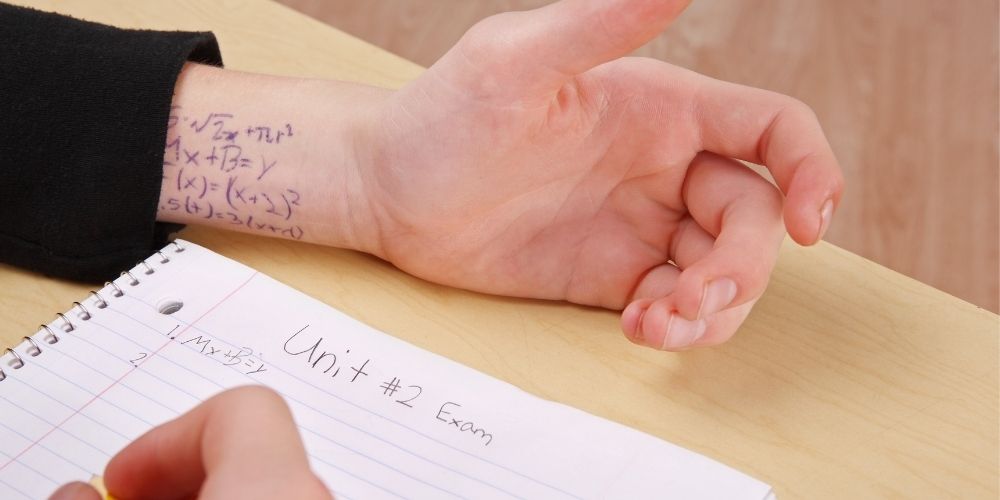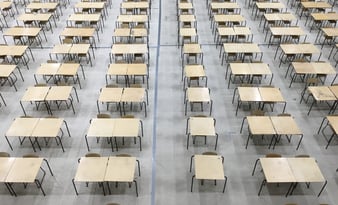Contents
- Is it okay to cheat in an exam?
- What are the consequences or rules around cheating on tests?
- How common is exam cheating in the U.K?
Exam cheating in schools and even universities are not unprecedented. It’s believed that many students have been involved in exam cheating at least once during their academic studies.
But, is it okay to cheat on tests? While it gives you the opportunity to do better on important tests, it is also recognised as a serious offence by most institutions. What are the consequences of cheating at uni? Can it have long-term effects on your overall behaviour? This post answers these questions and many more through a set of FAQs about exam cheating. 
Is it okay to indulge in exam cheating?
The most common opinion on this is: it depends. Low grades being seen as a badge of shame that discourages students from actively trying to participate in school, the student being busy with an equally important task, etc., are a few of the reasons often cited to justify cheating on exams. But is there a more objective answer to this question?
We believe that the negative consequences of exams cheating overpower the perceived benefits. Low grades being seen as a shameful thing is an institutional issue that should be taken up with teachers and/or the school’s administration.
Doing badly on an exam is definitely better than resorting to cheating and other unfair means. It isn’t okay to cheat on an exam, the occasional bad result is merely an outlier on the learning curve.
It is always better to embrace your mistakes and learn from them in order to make steady progress as opposed to the overnight academic success achieved by using unfair means. The goal of any academic course is after all to make the students more confident, and capable and to get them a step closer to becoming seasoned industry professionals.
What are the consequences or rules around cheating on tests?
If you are caught cheating on an assignment or exam, you may face serious consequences. These range from correctional academic measures to legal action depending on the nature and severity of the offence.
- Failing the class
While some professors might be slightly lenient with their class and allow offenders to simply retake the test, others might take stringent action and ask you to retake the entire course next term. Teachers – especially university professors – are usually given the right to decide their own course of action by school administrations.
- Copyright infringement
While most university cheating cases do not rise to the level of a copyright infringement trial, it is a possibility. Something like this can happen if the university or the student posts the assignment on a public platform and it contains copyright-protected material.
- Loss of scholarship
University applications require detailed academic transcripts from the applicant’s secondary school. These transcripts contain mark sheets, detailed character reports and personal recommendations from teachers/principals and other academic supervisors. Getting caught cheating will reflect in these reports and could effectively ruin your chances of getting the university scholarship you’re eyeing.
- Missing out on important information
This can happen if you frequently cheat on school tests. A lot of information taught in school forms the fundamentals that students need to succeed at university or at work. Cheating in school might get you through school, but it will surely make it difficult for you to cope with future placements.
How common is exam cheating in the U.K?
Exams cheating and cheating at uni is unfortunately on the rise in the U.K. Recent studies have found that students – especially university students who don’t live with their parents – have admitted to cheating more often in virtual exams because it’s easier.
The number saw a steep rise even before the pandemic, with the number of cheating cases found in universities rising over 40 per cent in the last decade. Experts believe increasing academic pressure, unrealistic expectations and rising competition at the university level are the primary reasons behind this.
It is important to focus more on the learning and skill development facets of exams as compared to just scoring well.
Students who are not well versed in particular subjects or are approaching them in the wrong way usually resort to cheating to obtain results. At GoStudent, we offer highly interactive online classes that can help you prepare for your exams and build confidence, so why not try out a free trial lesson today!









